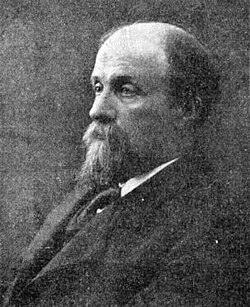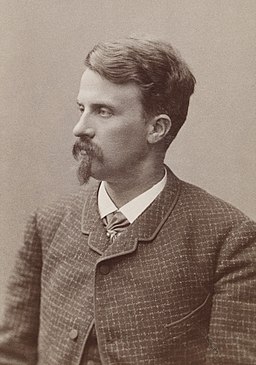Juhani Aho

Image from Wikipedia
License: Public domain
Biography
Juhani Aho was born on September 11, 1861 in Lapinlahti, Finland. He was the eldest child of Henrik Gustaf Brofeldt and Emelie Elisabeth Palmroth.

Daniel Nyblin, CC BY 4.0
via Wikimedia Commons
After finishing school, Aho — born Johannes Brofeldt — enrolled at the University of Helsinki, where he studied literature and became active in student journalism. During this time, he adopted the pen name Juhani Aho, which later became synonymous with the rise of Finnish realism. His university years exposed him to political debate, cultural nationalism, and the emerging Finnish-language literary movement, which shaped his early writing.
Aho first gained national attention with his novel Rautatie (The Railroad, 1884), a landmark of Finnish realism. The book humorously and poignantly portrayed rural life and the reactions of ordinary people to modernization. Its success established Aho as one of the most important young writers in Finland.
Throughout the late 19th century, Aho continued producing novels, short stories, and journalism. His writing often explored themes such as nature, social change, human psychology, and Finnish identity. His “splinters” (lastut) — short, impressionistic prose pieces — became one of his trademark styles and influenced future generations of Finnish writers.
Aho also worked as a journalist and editor for several newspapers, including the influential Päivälehti (the predecessor of today’s Helsingin Sanomat). He was known for his balanced yet insightful political commentary at a time when Finland was navigating tensions under Russian rule.
One of his most celebrated later works is Juha (1911), a powerful tale of love, betrayal, and tragedy that went on to inspire multiple film adaptations and an opera. Aho’s ability to blend realism with psychological depth made him one of Finland’s foremost literary figures.
Aho married Venny Soldan-Brofeldt, a prominent artist, and together they formed a dynamic cultural partnership. Their home in Järvenpää became a gathering place for writers, artists, and musicians, reflecting their deep involvement in Finland’s cultural life. The couple had two sons, Heikki and Antti Brofeldt, both of whom became influential cultural figures.
Juhani Aho died on August 8, 1921, leaving behind a literary legacy that helped shape modern Finnish literature. His work remains widely read and studied, not only for its artistic quality but also for its vivid portrayal of Finland during a time of transformation.
Selected Achievements
- Author of Rautatie (The Railroad, 1884)
- Creator of the influential “lastut” (splinters) short-prose style
- Author of Juha (1911), adapted into films and an opera
- Major figure in the development of Finnish realism
- Journalist and editor for Päivälehti / Helsingin Sanomat
- Pioneer of Finnish-language prose fiction
References
📍 Birthplace Location
Born on this day
Loading...